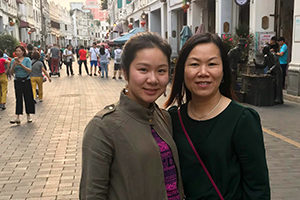Last June, a steady stream of students walked through the office of UC Santa Cruz’s First Generation Initiative, sharing smiling photos of themselves wearing black T-shirts emblazoned with “#FIRSTGEN COLLEGE GRAD” on Facebook and Instagram.
More than 3,600 first-generation UC Santa Cruz students—those whose parents had not graduated from a four-year college or university—graduated this year, proud families cheering them on.
The constant flow of posts barely scratched the surface. First-generation students comprised well over half of the students who earned graduate and undergraduate degrees at UC Santa Cruz in 2019—a striking reflection of the university’s commitment to social mobility.
This celebration has a purpose: By increasing the visibility of students who are the first in their families to attend college, the university can help first-generation students succeed in reaching graduation.
“Highlighting first-generation student narratives builds first-generation students’ sense that they belong and can succeed,” says Rebecca Covarrubias, associate professor of psychology and co-leader of the First Generation Initiative.
Changing the conversation
Assistant Vice Chancellor Gwynn Benner co-leads the program with Covarrubias. She sees the work as potentially creating models useful well beyond the UC Santa Cruz campus.
“We’re trying to change the conversation about what it means to be first-gen,” Benner said.
For the past year, the Jacques M. Littlefield Foundation has supported Covarrubias’ research and Benner’s team of student interns, who provide services based on Covarrubias’ findings. Now the foundation has provided a new gift extending the work over multiple years with the intention of inspiring additional funding.
“No one was looking at their cell phones”
Janely Cardenas Vargas’s exposure to the First Generation Initiative began in 2017 with an event at which Shonté Thomas, director of the African American Resource and Cultural Center, spoke about challenges she faced when she was an undergraduate.
“For the director of a program to say, ‘Yes, this is my experience, I expect it’s your experience too. It isn’t uncommon and we’re here to help,’” said Vargas (Merrill ‘20, psychology, Latin American and Latinx studies). “It broke down the divide.”
Vargas joined the initiative’s undergraduate student planning committee and presented her own first-generation experience at workshops and panel discussions. These events have been especially notable for audience engagement.
“At one panel, I took a moment to look down at the audience,” she said. “No one was looking at their cell phones.”
Christina Yu (College Ten ‘20, cognitive science), whose First Generation Initiative project is to create resources for parents of first-generation college students, noted “few resources like this exist to support parents and guardians of first-gen college students.”
“The resources and interviews with current students that were conducted with their parents is a starting point. We had students ask about their experience and share advice. Parents were interviewed in their native languages.”
The project seeks to help reduce the fears and worries parents and guardians may have about having their child at the university to feel more confident.
Much of the First Generation Initiative’s work takes these forms, sharing and celebrating the experiences of students and making sure students take advantage of services available on campus.
Supporting what works
Brothers Scott and David Littlefield lead the Jacques M. Littlefield Foundation, which was established in their father’s name. It funds sustainability and first-generation education causes in the Boulder-Denver region and the Bay Area.
“First-generation students deserve high-quality education to and through college,” says David Littlefield (Oakes). “So we’re happy to support the First Generation Initiative at UC Santa Cruz.”
Another grantee, Downtown College Prep, a high school in San Jose co-founded by alumna Jennifer Andaluz (Oakes ’94, American Studies), collaborates with ongoing research by Professor Covarrubias and her graduate students. Like Covarrubias’s work at UC Santa Cruz, her team investigates first-generation students’ experiences to inform how the school serves them.
Researchers work directly alongside teachers and staff. That means the research directly addresses questions relevant to the school and that any findings can be immediately put into practice.
“We work alongside students to identify mechanisms and levers of institutional change,” Covarrubias said. “The research is grounded in problems of practice. With research, we can figure out what is working and then make recommendations about how to support those practices.”
In the Culture and Achievement Collaborative, the student research lab Covarrubias leads, projects begin with first-generation students’ experiences and their questions.
“It’s a very empowering process for them to devise questions that matter the most to them and their families and communities,” she said. “The research results then inform practices to ensure their success, and other students like them, to and through college.”
Nicole Bergeron advises the Jacques M. Littlefield Foundation on philanthropy matters. She said the First Generation Initiative’s combination of services and student opportunities based on rigorous research was an important draw.
“The Jacques M. Littlefield Foundation already supports getting students to college,” she said. “We wanted to get students to and through college and ensure that they thrive. The UC Santa Cruz First Generation Initiative really hit all those notes.”
Bergeron said a goal of the renewed support was to inspire new grants and gifts for the initiative that can ensure ongoing operations in the indefinite future.
“Our hope is that we can shine a light on the initiative and other funders will come alongside,” Bergeron said.



